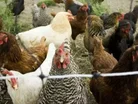Perdue Announces Reduction in Antibiotics at Chicken Hatcheries

Leading meat production and processing company Perdue Foods is setting a new standard for antibiotic usage in poultry production. Today the company announced that it has sharply reduced its usage of antibiotics, removing human-grade antibiotics from its chicken hatcheries entirely.
According to Perdue, this is the latest phase in an ongoing project first implemented in 2002, in which the company began evaluating public concerns over the way that the industry in general uses antibiotics in its poultry raising practices. Over the years this has led to the elimination of arsenic and medically significant antibiotics like floroquinolones in poultry feed years ahead of FDA recommendations, the acquisition of organic and antibiotic-free meat business Coleman natural foods, and now most recently the elimination of most antibiotics from all of its hatcheries.
“By no longer using any antibiotics in our hatcheries or any human antibiotics in feed, we’ve reached the point where 95 percent of our chickens never receive any human antibiotics, and the remainder receive them only for a few days when prescribed by a veterinarian,” said Dr. Bruce Stewart-Brown, Senior Vice President of Food Safety, Quality and Live Operations for Perdue Foods, in a statement to the press. “This very limited use of antibiotics is more restrictive than the new FDA Guidelines announced last December. We have yet to read any proposed legislation that we are not compliant with, and in fact, have been since 2008.”
With that said, Dr. Stewart-Brown is careful to acknowledge in the statement that Perdue’s operations are not 100 percent unconditionally antibiotic-free, a lesson that the company took away from its no-antibiotics-ever Harvestland® product line.
“We found that it is not realistic or responsible to eliminate all antibiotics,” said Dr. Stewart-Brown. “No matter how carefully you raise animals, some are going to be exposed to infections that can only be treated with antibiotics. As veterinarians, we have a responsibility to properly treat those animals. But, when we do treat chickens with antibiotics, we do it in a very focused and limited way that allows us to treat a single house and for the shortest duration possible, generally no longer than three days.”
Still, conservative and conscientious use of antibiotics is a great improvement over previous practices. Perdue is hoping that this step forward will go a long way toward inspiring consumer confidence – and if that occurs, such consumer brand confidence could in turn inspire wider changes across the the poultry industry at large.
[SOURCE: Perdue via Center for Science in the Public Interest]
- In-N-Out commits to eliminating unnecessary antibiotics from its beef supplyRestaurants
- Tyson Foods announces plans to drop antibiotics from chicken feedRestaurants
- Costco Joins the Movement to Curb Antibiotic Use in its Meat SupplyRetail
- Chicken With Less Antibiotics Could Come to KFCFranchising
Featured Articles
Fresh investment supports TRACT in enhancing tools for sustainability in the food and agricultural sectors, aligning with EU regulations
The devastating floods in Spain have shaken up the global citrus supply, heightening challenges in the fruit juice drinks market
McDonald's has spent 40 years supporting students with scholarships & plans to continue, despite Robert F. Kennedy Jr.’s plan to Make America Healthy Again

